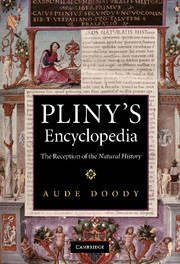Book contents
- Frontmatter
- Contents
- Acknowledgements
- Note on the text
- Introduction: how to read an encyclopedia
- 1 Science and encyclopedism: the originality of the Natural History
- 2 Diderot's Pliny and the politics of the encyclopedia
- 3 Finding facts: the summarium in the early printed editions
- 4 Specialist readings: art and medicine from the Natural History
- Conclusion: changing approaches to Pliny's Natural History
- Bibliography
- Index
- References
2 - Diderot's Pliny and the politics of the encyclopedia
Published online by Cambridge University Press: 04 May 2010
- Frontmatter
- Contents
- Acknowledgements
- Note on the text
- Introduction: how to read an encyclopedia
- 1 Science and encyclopedism: the originality of the Natural History
- 2 Diderot's Pliny and the politics of the encyclopedia
- 3 Finding facts: the summarium in the early printed editions
- 4 Specialist readings: art and medicine from the Natural History
- Conclusion: changing approaches to Pliny's Natural History
- Bibliography
- Index
- References
Summary
The Natural History has perhaps more often been used than read; the idea that it is an encyclopedia is one of the main justifications for taking a piecemeal approach to its many pages. It is hard to know what reading an encyclopedia for its own sake or on its own terms might look like. But in the last ten years, scholars have turned a more stringent eye on technical writing and the politics of these seemingly unproblematic texts. Michel Foucault's The Order of Things was instrumental in changing our attitudes towards the obvious and the innocent nature of knowledge texts, sensitising us to the powerful political and ideological undercurrents just beneath the surface. In Pliny's case, the last ten years has seen a move from the philosophical unity Mary Beagon discovered, to the anti-luxuria moralism that Andrew Wallace-Hadrill discusses, to new work that finds a unity of purpose in the centrality of Rome and Roman imperialism to the project of knowledge gathering and presentation in Pliny's Natural History. This notion of a Roman encyclopedia allowed critics to find an originality of sorts in the Natural History, in the form of the worldview that Pliny encodes into his text.
This idea that the Natural History can be used to probe the links between Roman knowledge and Roman power is well established. It has underpinned arguments about Pliny's preface, his sources, his art history and his treatment of women in the text.
- Type
- Chapter
- Information
- Pliny's EncyclopediaThe Reception of the Natural History, pp. 40 - 91Publisher: Cambridge University PressPrint publication year: 2010

